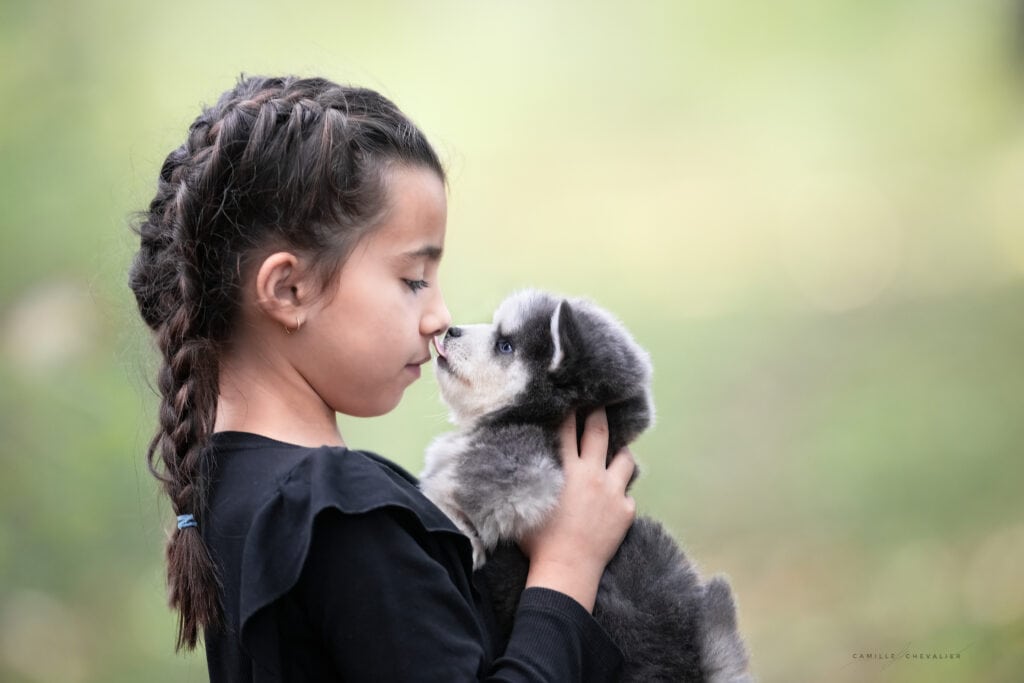
The Pomsky and Family Life
When we talk about a family dog, the first image that often comes to mind is the loyal, caring, calm, and non-aggressive Labrador that will take care of children. Can the Pomsky be included in the list of family dogs?
The Pomsky is the result of a deliberate crossbreeding between a Husky and a Spitz. The goal was to obtain a dog with the morphology of a Husky but a milder temperament. The Spitz is indeed a small, cheerful, and affectionate dog. The Husky, on the other hand, is intelligent, independent, affectionate, and has a great need for exercise and exploring the world.
The crossbreeding of these two breeds results in a small-sized dog that is cheerful, friendly, close to its family, intelligent, and has a need for exercise. In my opinion, the Pomsky is easier to train and more malleable than the Husky. In most cases, the Pomsky does not have the primitive and wandering nature of the Husky.
Therefore, the Pomsky can be well suited to family life as long as you are willing to invest in its training, have time to dedicate to it, and have the desire to share numerous activities with it. We have also written an article about activities you can do with your Pomsky: Activities for Your Pomsky: Ideas to Enjoy Your Pomsky (royaumedesgalopins.fr) We recommend a minimum of 1.5 hours of activity per day with your Pomsky, and the activities can be varied, depending on your choice.
The Temperament of the Pomsky with Children
This is a question that comes up very often: Can the Pomsky live with children? The answer is yes. Our breeding, Le Royaume des Galopins, regularly places Pomskies with children, and it goes wonderfully. We have not had any negative feedback so far about the relationship between a child and a Pomsky.
The Pomsky has a sociable temperament, meaning that it will spontaneously tend to approach others and seek their contact. Whether it's adults, children, or other animals, the Pomsky will naturally approach them and seek their contact. Therefore, we can say that the Pomsky is a sociable and friendly dog.
The Pomsky is also a gentle dog in its approach, and it tends to approach children gently rather than abruptly, which will be greatly appreciated by children.
In our breeding, the Pomsky does not show any aggressiveness. We have never had cases of growling or biting. On the contrary, it is a well-balanced dog that demonstrates a stable temperament, far from any fear or aggression.
The mini husky and children
This small dog is also playful and dynamic, which will greatly please children. It will always be ready to follow them in the garden, go for a bike ride, do agility, or go swimming. The Pomsky enjoys all kinds of activities and is always eager to discover new places. Of course, the activities should be adapted to the age and size of your Pomsky puppy.
The Pomsky also enjoys learning new tricks. Despite its sometimes stubborn nature, the Pomsky will always be ready for some obedience exercises. Its intelligence allows it to quickly memorize new commands. This moment of complicity and education should be very enjoyable for your Pomsky as well as for your children.
Our Pomskies adapt perfectly to your 1-year-old little boy. They are close to him without being intrusive or rough. The relationship is wonderful. They have developed a bond full of complicity and gentleness with him.
Precautions to Take When Adopting a Pomsky Puppy
Of course, it is important to carefully choose your future puppy and its breeder. Indeed, the socialization of the puppy and the selection made by the breeder will be crucial in the relationship your puppy will have with your children.
For a balanced and suitable Pomsky for your children, here are a few key points to check:
Is the breeder registered and does it have a breeding registration number (SIREN number)?
This is a very important point to verify. In fact, it is illegal for a non-professional individual to sell a Pomsky. The Pomsky is a non-recognized breed and its reproduction is strictly regulated to prevent trafficking, inbreeding, genetic diseases, fraud, etc.
Being a breeder is a profession that includes socialization and compliance with health and regulatory rules. Going through a professional means having legal guarantees and protections in case of disputes.
Have the parents of your puppy been tested with Embark?
The Embark test verifies the DNA of the parents to confirm their Pomsky lineage, specifically Husky Spitz. This test checks for over 230 genetic diseases, helping breeders prevent genetic issues.
The DNA Embark test results of the parents should be shown and/or provided to you at the time of reservation. Never commit without an Embark test, as it is your only way to be sure that your Pomsky is a true Pomsky and not a crossbreed of multiple breeds.
Are the parents of your future puppy present at the breeding?
More and more breeders have breeding contracts, which means that the parents of your future puppy live with families throughout the year and return to the breeding for breeding purposes. This practice is strictly prohibited according to the Order of April 3, 2014, which states: "A breeder can only market products from their own breeding. They are the holder of the breeding females and litters that they raise in their breeding facility, which are identified with their name or the trade name of the breeding." It is important for many reasons to make sure that the parents are present at the breeding: for sanitary and temperament reasons, as well as for legal and non-deception of families.
See and spend time with the parents of your future puppy
This is also an important point for several reasons. The morphology of the parents will tell you a lot about the future morphology of your puppy. If you do not like the parents, then do not go any further. The overall condition of the parents and the care provided by the breeder to the breeding dogs also speaks volumes about the care they provide to their puppies. Finally, it is also important to see the temperament of the parents, as it will influence the temperament of the puppy.
Therefore, it is always preferable to choose an adult dog that you like physically and has a friendly temperament.
Spend time and meet your future breeder
Finally, the last crucial point is to spend time with the breeder of your future Pomsky. You should feel confident and enjoy the time spent together. Your breeder should support you before and after the purchase of your future puppy. They should guide you and provide you with the necessary information for the proper care of your Pomsky.
Of course, they should sell you a puppy that is vaccinated, identified, dewormed, and comes with a certificate of good health and an invoice.
If you choose a breeding that meets the points described above, you will end up with a Pomsky with a stable temperament, a friendly, happy, and kind puppy that will get along wonderfully with your children.

Teaching children how to interact with a Pomsky puppy
It is also important to teach children how to interact with their Pomsky puppy. The Pomsky is a gentle and friendly dog, but there are rules to follow in order to create a beautiful relationship based on trust.
One of the first rules to follow is not to disturb a dog that is sleeping or eating. Rest is essential for a puppy's well-being, so it's important to respect their rhythm and not wake up a sleeping dog. This is one of the golden rules to teach your child, that a dog is a separate being and their basic needs, such as sleeping, should be respected.
You don't disturb a dog when it's eating - it's its private time and disturbing it would be unwelcome. So let the puppy eat quietly.
Children should also not pull on the dog's ears or tail. These actions, although funny and natural for a child, are very unwelcome and could hurt or startle the puppy. It's important to teach your child that the dog's body belongs to them and under no circumstances should the puppy's fur, ears, or tail be pulled.
Allowing a dog to leave when they want to is also an important rule to respect. Children tend to want to pick up the puppy, have them next to them all the time. But it's important to respect the puppy's desires, as they may not always be willing. In fact, it's not necessarily beneficial to allow a young child to carry a puppy... On the contrary, one should be cautious as the risk of falling is real and could be dangerous depending on the puppy's age.
Respecting the puppy's comfort zone and tranquility is also important.
It is important to explain to the child that the puppy has its own space, like a bed or a crate, and when the puppy is in that space, it should not be disturbed. Therefore, we should not cuddle or pick up the puppy when it is in that space, and we should wait for it to come out before seeking its attention.
All these rules aim to reinforce the bond of trust that the puppy will have with their little human. Most dog bites occur with minors. It is therefore important to explain to children the rules to be respected towards their own dog as well as towards dogs they do not know, such as those they may encounter on the street.
It may also be very interesting for the family to study together the calming signals in dogs. I am attaching a link that is very informative on this topic: Calming Signals in Dogs - Toutoupourlechien.com. Calming signals indicate the dog's discomfort or need to reassure and calm themselves.
Conclusion: A Beautiful Relationship between Pomsky and Children
The Pomsky is a great choice if you are looking for a sociable and friendly family dog. It remains an active dog that needs to expend energy and enjoys discovering new things.
Your children will be delighted to share numerous activities with the Pomsky, and it's likely that your children will tire out faster than your Pomsky.
The Pomsky is generally easy to train, although stubborn, and their high intelligence allows them to quickly understand different rules. This eagerness to learn is a great opportunity for your child to work on obedience with the dog and share moments of companionship.
Although the Pomsky is a tender dog and far from aggressive, it is important to establish rules from the moment they arrive that your child must respect for a peaceful and healthy relationship.